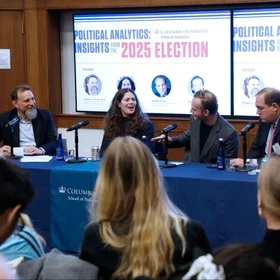Dr. Cindy Pace spends her days as vice president and global head of the Diversity, Equity, and Inclusion Center of Excellence at MetLife and her evenings teaching the Inclusive Leadership course in Columbia’s Human Capital Management program. She was inspired to bring her DEI expertise to SPS because she saw a need for the next generation of leaders to understand the importance of inclusion. She finds that the professionals she works with “want to be part of a team but don't want to lose their identity.”
In a recent interview, Dr. Pace spoke about her new HCM course, Inclusive Leadership, and what it means to bring diverse voices into important conversations.
What are some of the challenges of creating an inclusive work environment?
Challenges come about when people don’t have a solid understanding of inclusion, and if you don't know its value and what it really means, then how can you embody being an inclusive leader? When I teach the class, students will say, “Oh my gosh, that is so simple!” but sometimes the simplest concepts are the most challenging and complex to execute. It's a systemic change that has to happen at three different levels: the individual shift, in groups or teams, and at the organizational level.
How have your students responded to your Inclusive Leadership course so far?
I've had a great response from the students. I think what I've heard over and over again is, “Wow, this class is more than I thought it was going to be.” I think some students are attracted to the course because they have an interest in social justice. However, when they actually take it they realize it is really a leadership class, which they may not have been exposed to before.
What are some of the characteristics or practices of an inclusive leader?
Inclusive leaders have a very keen sense of listening and truly hearing people. They're able to pick up on things that someone isn't saying directly if they have a different communication style. They are also very curious. They want to know how they can tap and unleash the fullest potential that people have. An inclusive leader goes beyond their needs to understand the needs of others.
Inclusive leaders are not always the first to speak, but they are very good at facilitating discussions. They foster opportunities for individuals to speak and make sure diverse voices are brought in. They have a great way of what we call disrupting dominant logic. When everyone's thinking the same thing, an inclusive leader continues to probe and push to make sure that they don't leave anything unturned.
What would your advice be for a person from a diverse, nontraditional, or underrepresented background trying to rise into a leadership position?
Authenticity has to be one of your superpowers. Don't spend time cutting away parts of yourself. Find your people; those who are going to support your aspirations and also remind you who you really are. In terms of leadership and finding unity, that's what's going to fortify you.
About Cindy Pace
Dr. Pace has over 20 years of experience in healthcare, biopharmaceuticals, corporate management, and DEI. She has a Ph.D. from Columbia University and a master’s degree from NYU. Dr. Pace’s research and practice focus on advancing diverse women into business leadership roles.
About the Program
The Columbia University M.S. in Human Capital Management program prepares graduates to be world-class HCM strategists able to address changing needs in building and motivating talented, engaged workforces in the private, public, academic, and not-for-profit sectors. The program is available part-time, full-time, on-campus, and online.


